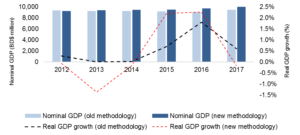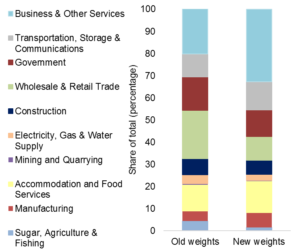Gross Domestic Product (GDP) is a widespread measure of economic performance that captures the value of all goods and services produced in a country during a specific period of time (e.g. one year). Yet, there are two key challenges when estimating GDP: i) How to capture the whole economy; ii) how to estimate the value added of all goods and services produced. Given that GDP is a key indicator used in economic analysis, the drawbacks we face in its measurement can have major implications for decision-making.
As we do not have perfect measures of the quantity and value of all the goods and services that are produced in an economy, we make use of assumptions. There are three methods for calculating GDP: (a) the production or output approach, (b) the expenditure approach, or (c) the income approach.
For example, in the output approach, statisticians first estimate the value added of production (i.e. the value of production minus the value of inputs) in a sample of firms across a range of sectors. GDP is then estimated as the weighted sum of these sectors. These calculations are generally revised on a regular basis. But the quantity, quality and frequency of the data, as well as the weighting assigned to each sector, can lead to substantial deviations in the final value of GDP.
In Barbados, the revision and rebasing of GDP has been an important topic of discussion in recent years. For the first time since 1974, the Barbados Statistical Services and the Central Bank of Barbados presented new GDP estimates in August 2018, using the revised methodology. GDP is now based on 2010 prices and on a revised set of weights for the different industries, which are considered more appropriate to reflect the structure of the economy today. The new series has resulted in a higher value for GDP and a variation in its growth rate, as seen in Figure 1.
Figure 1. Nominal and real GDP growth estimates 
Figure 2. Old and new real GDP weight breakdown
Sources: Barbados Statistical Services and Central Bank of Barbados
Based on this revision, the new estimates:
- Allow for a more realistic assessment of the economy. The new methodology makes use of new variables that measure production and now include a wider range of service industries, increasing the total number of sectors from eleven to sixteen. This has resulted in a larger weight assigned to Business and Other Services and a lower weight assigned to Wholesale and Retail Trade, as seen in Figure 2.
- Change the interpretation of how the economy has been evolving in recent years. As seen in Figure 1, the real GDP growth rate was higher for 2015 and 2016 than had previously been estimated. The revision thus highlights a more protracted slowdown of the economy in 2017 and 2018 than was previously thought.
- Impact other key economic measures, such as debt-to-GDP ratios. This could then affect the size and the design of the fiscal reform program in Barbados.
- Have a direct implication on the amount of funding that the government can receive from international partners going forward. A broad range of loan instruments and quotas in international institutions are based on the value of GDP. For example, in 2018, the IDB Group committed to providing 2% of GDP worth of budget support to the Government of Barbados. Under the new GDP methodology, this is roughly US$100 million.
GDP is based on imperfect measures and how it is calculated can lead to substantial deviations in its value. Given its relevance as an indicator of economic performance and its major implications in decision-making, understanding how it is computed, and knowing how and when it should be applied in policy is important.


Leave a Reply